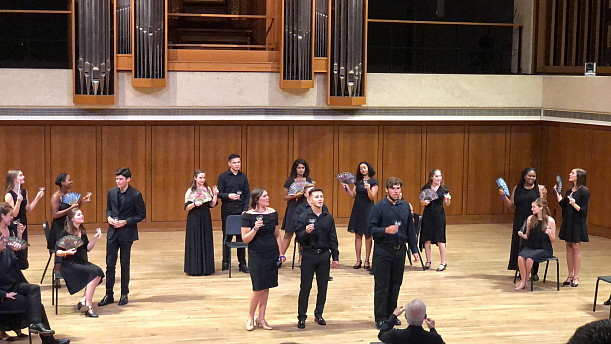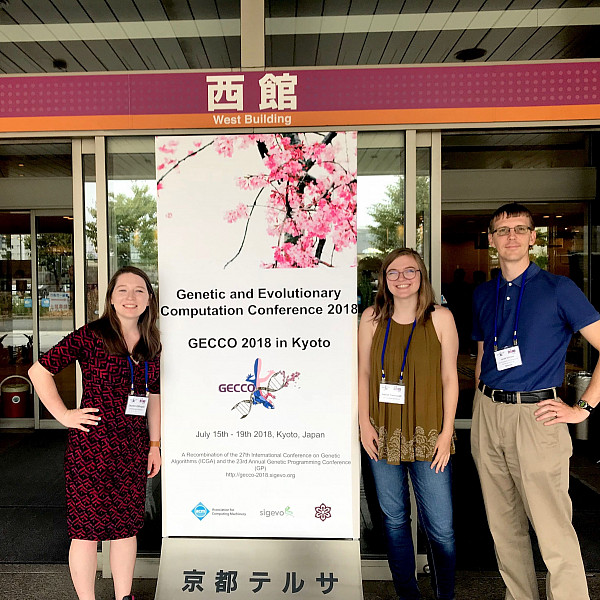News
From Chemist to Countertenor
April 17, 2019
April 17, 2019
Open gallery

When Mauro Garcia ’18 arrived at Southwestern University, he resembled a lot of first-year students: he was a biology major pursuing the premedical pathway. But after taking an introductory course with Professor of Chemistry Maha Zewail-Foote, Garcia discovered a challenging but enjoyable new path, one that led him to switch majors and engage in the SCOPE summer research program. “I just really fell in love with chemistry,” he recalls. He decided that he would work toward becoming a chemistry professor.
However, like many other students at Southwestern, Garcia was about to find another passion: vocal performance. Growing up in small Port Lavaca, Texas, Garcia had little access to music education, so he took advantage of the interdisciplinary requirements of the University’s Paideia approach to education by enrolling in voice lessons. He only needed two credits, but by his final semester of college, he had taken nine credits total. “I am a first-generation college student, and I was always interested in music, but my parents wanted me to be a doctor. Then I wanted to be a chemistry professor. But then I fell in love with opera.” He began as a tenor but then discovered that he could truly shine as a countertenor because his vocal range matches that of a female mezzo-soprano. Countertenors are rare today, so Garcia’s ability to sustain the falsetto register links him with the castrati who were the superstars of seventeenth- and eighteenth-century opera.
The young opera singer began considering vocal performance as a career, so Dr. Dana Zenobi, former Southwestern faculty soprano and Garcia’s voice professor at the time, advised him to pursue classical training because the profession is so specialized. Zenobi encouraged Garcia to apply for the Sarah and Ernest Butler Opera Center Young Artist Program at the University of Texas at Austin. The intensive three-week experience provides advanced vocal training for young singers, preparing them for admission to and successful integration into nationally recognized music programs. For his audition, Garcia performed “Ombra Mai Fu,” the opening aria from George Frideric Handel’s 1738 opera Serse (Xerxes in English). “Honestly, that was the best I ever performed that song,” the young countertenor recalls. “I was surprised by myself.”
Garcia recognized a fascinating intersection between his life of science and his life of music: “The most interesting connections I have made were between vocal pedagogy and the underlying anatomical components that make vocal production possible,” the singer says.
After winning a coveted spot in the program and being funded by a Sarofim School of Fine Arts travel grant from Southwestern, Garcia spent eight to nine hours each day last June receiving voice coaching on specific songs and engaging in private lessons to improve his vocal technique, focusing on diction, vocal pedagogy, and body alignment. In those lessons, Garcia recognized a fascinating intersection between his life of science and his life of music: “The most interesting connections I have made were between vocal pedagogy and the underlying anatomical components that make vocal production possible,” the singer says. Taking physics courses and conducting research in physical chemistry at Southwestern helped improve his understanding of how the mouth and throat shape sound and create lyrical tones.
Those long days were also devoted to rehearsing operatic scenes, including staging, musical phrasing, and choreography. From his cheering and diving days at Southwestern, Garcia was able to incorporate tumbling into these performances. The work was exhausting but fulfilling. “I was always in the sciences and thought the arts were so easy, but it’s actually really intense,” Garcia reflects. “Everyone works really hard, and I like that.” He found it especially exciting and rewarding to play the principal roles of Prince Orlofsky in Die Fledermaus and the Witch in Hänsel und Gretel. To get into each character and understand their motives, he had to translate the texts, learning how to pronounce French and German, which he had not previously studied. Garcia remained undeterred, seeing value in the opportunity to study music in an environment in which performers were expected to meet professional standards.

Having graduated in December 2018, Garcia has multiple paths before him. He is putting together audition videos for applications to graduate programs in opera, but he’s also applying for research internships, jobs, and master’s programs in chemistry. He may pursue both paths simultaneously: study chemistry by day and take vocal lessons by night, or rehearse from dawn to dusk and read chemistry after hours. Whatever he chooses, “I’ll make it work,” assures Garcia. In the meantime, the recent graduate is thankful that his experiences at Southwestern and the Butler Opera Center have been so instrumental in his professional development as a musician. “Whenever I was performing, I just remember standing on the stage and singing, and the spotlight was on me, and it just felt like it was everything I ever dreamed of,” Garcia says glowingly. “I just want to be on stage performing for people. I like that sometimes you perform the same song but you still get a thrill. It’s like telling the same story all over again but in a different way.”
















